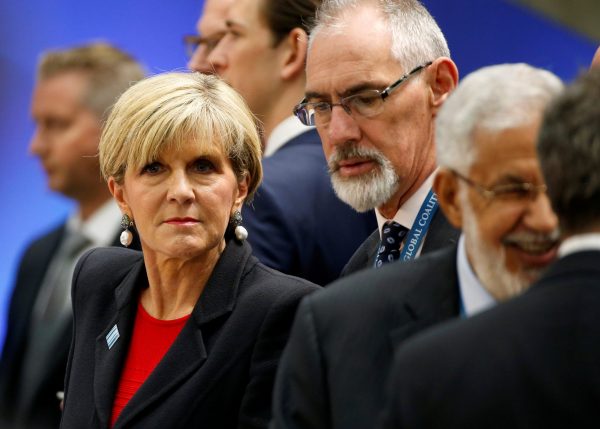Foreign policy is unkind territory for work like this. Its purpose is to respond to and shape an international environment in a permanent state of change. Australia’s first foreign policy White Paper in 1998 was soon overtaken by the Asian financial crisis. Any document issued this time last year would have missed the huge implications of Donald Trump’s election.
And white papers are public documents. If you are setting out a long-term framework for tax policy you want to be as clear as possible. That’s not always the case with foreign policy. You may not want to say precisely what is on your mind when you are describing, say, the political outlook for a close Asian neighbour, or your anxiety about aspects of the behaviour of the United States. So the final document, due later this year, will be raked over by prudent Australian diplomats to smooth out unnecessary provocations.
We can anticipate some of its themes. It will include a broad description of the international landscape and the way it is changing, set out in general terms Australia’s interests and values and point in careful and cautious terms to some of the priorities. We can expect it to renew in some form the commitment made by every Australian government since the early 1950s to a global order based on agreed rules, closer relations with its regional neighbours, and support for the US alliance.
There’s nothing wrong with that. It will usefully signal both internally and externally the Australian government’s broad foreign policy stance.
In some ways, the final document will be less important than the process that delivers it. It has already stirred up a solid amount of public interest, reflected in thoughtful submissions from hundreds of individuals and groups ranging from the Football Federation of Australia to the Sydney Symphony Orchestra. They provide a telling reminder of the way foreign policy now affects all aspects of Australian life.
A second benefit should come from extensive, frank and classified discussions inside the National Security Committee of Cabinet. Anyone who has sat through high-level meetings of ministers knows how easily urgent, tactical issues drive out long-term strategic debate. This will be a chance for ministers, if they are willing to take it, to step back from their daily pressures and reflect on the deeper international challenges Australia faces.
These challenges are more difficult and complex than any Australia has confronted for decades.
The economic and strategic consequences of China’s rise are recalibrating Australia’s world. The post-war global order of the past 75 years has run its course. The technologies of globalisation will remain with us but the normative spirit of globalism is on the defensive.
New arrangements and approaches are coming and Australia needs to protect what is important from the current system, and help to construct the new one, just as Australia did at the end of the Second World War.
Australia’s basic objective in the uncertain times ahead should be to maximise the choices it has: to avoid cutting off options, to tend a more diverse range of markets and partners and to deepen its international engagement.
Despite the inevitable constraints of its form, the White Paper can strengthen Australian foreign policy in three areas.
It needs to persuade Australian voters just what economic and security stakes they have in an open, liberal international system. That job is increasingly important as nativist and protectionist sentiments spread around the world.
It also needs to say something about Australian values (or, more accurately, the values Australians hold). In a democracy, support for foreign policy has to rest on something more than the narrow self-interest of the state. And it is important to remember how relatively recent the view that Australians have of their society as open, international and pluralistic. These norms need to be continually refreshed.
For policymakers as well as the public, the paper can usefully clarify some central concepts about the sort of world Australia wants to shape. The language of diplomacy has a tendency to obfuscate and elide. Sometimes that is for good reasons: successful negotiation can depend on it. But it is dangerous when it leads to camouflaging the meaning of the underpinning concepts such as a ‘rules-based global order’, a ‘region free of coercion’, or the responsibilities and expectations of an ally. If Australia wants to achieve its policy objectives, it needs to know what it means.
The recent Australian budget shows that the Australian government continues to prioritise spending on defence, intelligence and policing over that on foreign affairs. But if the White Paper’s likely conclusions about the uncertainty of the times and the importance of international engagement are to have real force, the Australian government should also signal a willingness to remedy the longstanding underinvestment in the instruments of Australian diplomacy.
Allan Gyngell is Adjunct Professor of Public Policy and Director of the Crawford Australian Leadership Forum at the Crawford School of Public Policy, The Australian National University. He is the author of Fear of Abandonment: Australia in the World since 1942 (La Trobe University Press, 2017).

